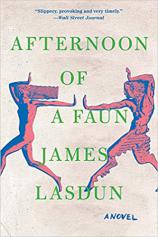Afternoon of a Faun
Review
Afternoon of a Faun
Modern sex scandals echo Greco-Roman myths of horned and hooved predators raping woodland nymphs, such as Syrinx, whose cries were silenced when she metamorphosed into hollow water reeds in the lecherous goat-god Pan's embrace. His panting created haunting music, and he crafted pipes from her reeds, romanticizing the assault with her stolen voice. Today, a pantheon of celebrities have been exposed for disturbing licentious behavior as women have become vocal about sexual assault. Victims are metaphorically removing the lid on Pandora’s pithos of curses, unleashing chaos into the lives of prominent men through these allegations.
James Lasdun’s AFTERNOON OF A FAUN is an apropos commentary on the #MeToo movement from a male perspective. Taking place in 2016, the elephant in the room is the Republican candidate for the U.S. presidential election, Donald Trump. In this novel, British expatriate journalist Marco Rosedale finds himself starring in his own scandal, and his unfolding drama dovetails with the pandemonium resulting from Trump’s infamous “locker-room banter.”
Marco’s "ordeal" begins when he is contacted by Mel Sauer, a features editor from a fictitious newspaper called the Messenger in England, about a memoir excerpt written by former fling Julia Gault. The editor wants Marco’s thoughts regarding the piece, and offers him the option of writing a riposte, giving his side of the story. Marco is initially flattered, and his first reading of the excerpt makes him “briefly nostalgic for his younger, cockier self.” Upon a closer second reading, Marco realizes she is accusing him of raping her while she was inebriated in a Belfast hotel room 40 years ago. Fearing her memoir will ruin his life, he attempts to silence her by repeatedly derailing publication, insisting that their encounter was consensual and her accusation defamatory.
"The timeliness of AFTERNOON OF A FAUN does not necessarily date this novel, and the issues of sexuality and consent it addresses will no doubt be a topic of conversation for quite some time."
Narrated by an unnamed close friend of Marco, the novel opens with an anonymous woman giving a speech at the Irving Foundation about "the relationship between rape and memory," which the two men attend. "It isn't enough to violate the woman's bodily autonomy,” the speaker says. “Her version of events must be seized and subjugated. In many cases it is this secondary attack, the seizing of a woman's reality....that proves the most traumatic in the long term."
The malleability of memory intrigues the narrator as he tries to discern the truth. Lasdun has a talent for crafting complex characters, and the narrator’s emotions vacillate between compassion for the victim and defensive loyalty of his friend. He also knew Julia in his youth, and is guilty himself of sexually objectifying her as he reminisces about having a “crush on her” as a teenager.
Marco remembers Julia as being a “lioness,” and not the type of woman who would allow him to force himself upon her, though he does acknowledge that she may have been reluctant. When the narrator’s wife tells Marco that “people have sex reluctantly all the time,” herself included, the narrator is troubled by memories of when he may have inadvertently coerced her into sex. “Was it my responsibility to think through the situation from her point of view as well as my own?” he ruminates. Subtly addressing marital rape, Lasdun highlights the importance of women communicating their true desires in the moment, rather than acquiescing under pressure to please their partner, as well as the necessity of men listening and respecting their boundaries.
As Marco scours his memories of the past, he recalls being seduced by an anthropology professor at university when he was 19, who “wanted the sensation of being taken by force.” The narrator says that “she assured Marco she’d taught him an infallible method for arousing women, and guaranteed him limitless success with future lovers if he applied it.” This is one of the most disturbing facets of the novel, as it juxtaposes one woman’s sexual fantasy of submission with the ambiguity of consent in Marco’s encounter with Julia, in much the same way that the controversial success of the Fifty Shades of Grey franchise has seemed at odds with the #MeToo phenomenon. While this tryst is solely related from the perspective of Marco, it delves into the murkier arena of erotic kinks and roleplaying, and he himself could be perceived as a victim in an unethical relationship between a professor and her student. There is, however, a clear delineation between a consensual agreement about enacting this type of intimate fantasy, and committing sexual assault with the horrifying presumption that all women desire it.
Further revelations of this sort create a palpable tension and creeping suspense throughout the narrative. Despite clues in Marco's recollections that he may be guilty, the biased narrator tends to lean in favor of his friend, and if Julia admits to one fabrication, it "taints" her credibility.
Lasdun approaches this sensitive topic with empathy, and the satisfying sardonic ending intertwines with anticipation of the election results. The timeliness of AFTERNOON OF A FAUN does not necessarily date this novel, and the issues of sexuality and consent it addresses will no doubt be a topic of conversation for quite some time.
Reviewed by Rachel McConnell on May 3, 2019
Afternoon of a Faun
- Publication Date: April 7, 2020
- Genres: Fiction
- Paperback: 192 pages
- Publisher: W. W. Norton & Company
- ISBN-10: 0393357880
- ISBN-13: 9780393357882




